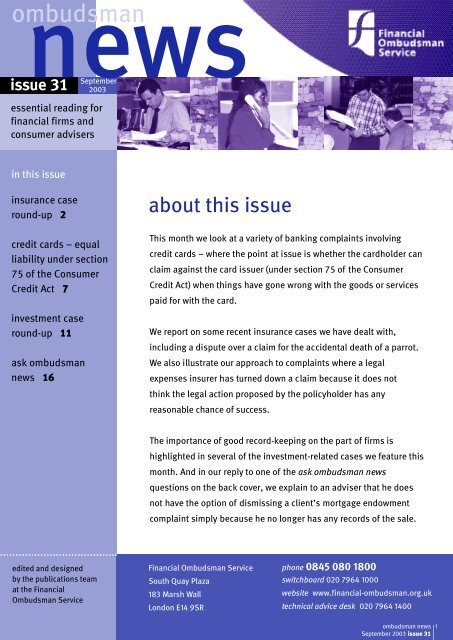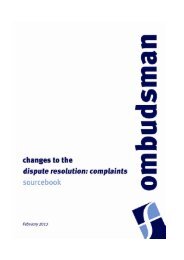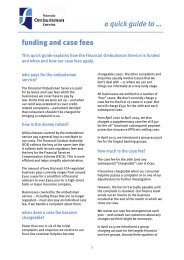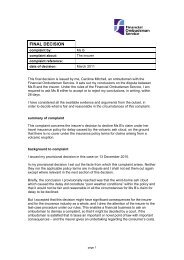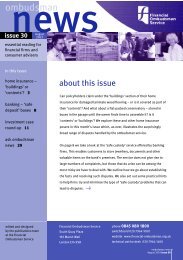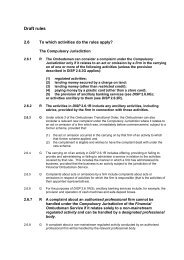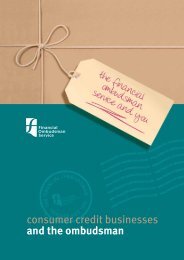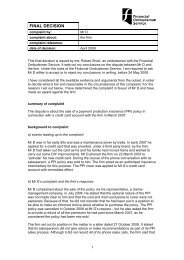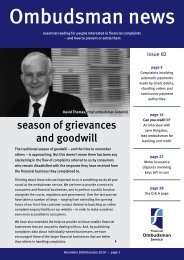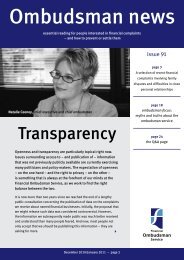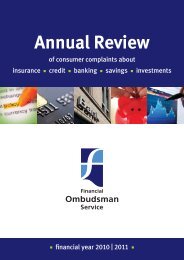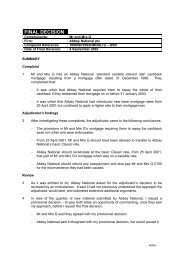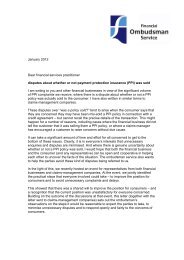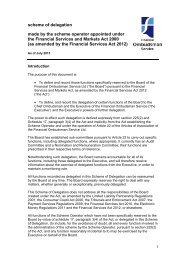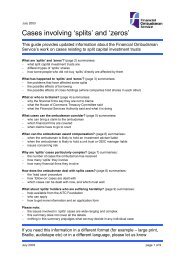ombudsman news - issue 31 - Financial Ombudsman Service
ombudsman news - issue 31 - Financial Ombudsman Service
ombudsman news - issue 31 - Financial Ombudsman Service
- No tags were found...
You also want an ePaper? Increase the reach of your titles
YUMPU automatically turns print PDFs into web optimized ePapers that Google loves.
In a NutshellTHE NEWSLETTER FROM THE FRIENDS OF STANDEN ESTATE:NUTS ABOUT STANDEN!In this edition of In a Nutshell:QUIZ NIGHTFoSE-WEARPLANT OF THE WEEKMEET THE VOLUNTEERSLEBANESE EVENINGTULLY THE TRACTORTRUST EVENTS AT STANDENAND FINALLY…No 16 September 2013Test your WitsThe next event organised by FoSE will be a Quiz Night, which will take place in theBarn Café on Wednesday 13 th November, starting at 7.30 in the evening. Onceagain, all proceeds will go towards buying the new greenhouses. This event will beopen to all Standen volunteers, their friends and family; we are hoping also toattract teams with connections to other local Trust properties. So if you knowsomeone who volunteers or works at a nearby NT property, give them the headsup.Teams can be from 4 – 6 people strong, and tickets will be £2 a head.Quizzers will be encouraged to bring their own drink and nibbles, but we hope tohave tea and coffee and hot soup available to buy during the interval. Prizes willbe won, but it should be a fun evening for winners and losers alike, so pleasespread the <strong>news</strong>. Formal invitations will go out later.Easier TermsSome people have had to wait a long time between paying for their FoSE-wearorders and receiving the goods. This is because an order can’t be placed beforethere are enough items to make it worthwhile for Wealden Workwear to set theirThe Friends of Standen Estate is affiliated to NATIONAL TRUST Registered Charity No 205846
2 credit cards – equal liabilityunder section 75 of theConsumer Credit Act 1974Paying for goods or services by credit card isnow a major part of daily life, with many peoplepreferring this method of payment to using cashor cheques. An advantage of using a credit cardis that, under section 75 of the Consumer CreditAct 1974, customers who have a claim against asu pplier for brea ch of co n t ra c tor mis re p res e n ta t i o nwill generally have an equal claim against thecard <strong>issue</strong>r.Also, section 75 only applies if the credit hasbeen provided under a ‘pre-existing arrangement’that involves both the supplier and the creditprovider. So credit cards are covered becausesuppliers are signed up by one firm (called the‘acquirer’) to accept cards belonging to therelevant network – such as Mastercard or Visa.The arrangement involves both the supplier andfirms that <strong>issue</strong> cards through that network.Claims are often made against the card <strong>issue</strong>rwhen the supplier has gone out of business ordisappeared. Firms will sometimes tell customersthat they must first get a court judgment againstthe supplier. That is wrong. The customer canchoose whether to claim against the supplier, thecard <strong>issue</strong>r, or both.In a case re p o rted in <strong>issue</strong> 21 of o m bu d s m a nnew s ( case stu d y 21/11), we awa rded a custo m e r£250 co m p e nsation for the inco nve n i e n ce a firmca used by re p ea te d l y, and inco r re c t l y, te ll i nghim tha t i t was o nl y re q u i red to meet h is claimi f he first ob tained a co u rt j u d g m e n t a ga i nstthe su ppl i e r.For section 75 to apply, certain conditions mustbe met. Most credit card purchases will becovered, but:• the cash price of the goods or services mustbe more than £100 and not more than£30,000; and• purchases are not covered if they are made bydebit cards or by charge cards (where themonthly bill has to be settled in full).However, credit card cheques are not coveredbecause they can be made payable to anyone –not just to the suppliers appointed to accept thecredit card. And the credit card company wouldnot share liability if the card was used towithdraw cash to pay for the purchase.There can be problems if the card is accepted by adifferent business from the one that provided thegoods and services. We see this situation mostfrequently in connection with timeshare andholiday club membership, where it is not unusualfor the timeshare or holiday club company to usethe credit card facilities of another business. Thebusiness accepting the payment may simply beacting as agent for the supplier, in which casesection 75 will not apply. In order for section 75to apply, the business that accepts the paymentand the supplier have to be ‘associates’, asdefined in the Consumer Credit Act.Where customers use a credit card to buy airlineor other travel tickets from a travel agent, theycannot normally claim against the travel agent ifthe airline delays or cancels the flight. This isbecause the travel agent contracted to supply theticket, not the flight. So the customer would nothave a claim under section 75 either.<strong>ombudsman</strong> <strong>news</strong> 7
However, things are different if customers use acredit card to buy the travel agent’s own‘package’ of travel arrangements. In suchinstances the agent is the supplier of theholiday package. This situation is illustrated incase study <strong>31</strong>/6 on page 9.Section 75 does not, in itself, provide gro un dsfor a claim aga i nst a su ppl i e r. Custo m e rs m ustha ve a valid claim of b rea ch of co n t ra c to rm is re p res e n tation under other law, su ch as t h eS a le of G o o ds Ac t or the Mis re p res e n tation Ac t.I ft h e y d o, then they ha ve a l i ke claim aga i nst t h eca rd provider f o r the full amount of the claim.The claim is not limited to the amount of thecredit card transaction. Customers can claim forall losses caused by the breach of contract ormisrepresentation. And this applies even if allthey paid by credit card was the deposit.S o, for exa m ple, a customer who pays a deposi tfor go o ds – usi ng a cre d i t ca rd <strong>issue</strong>d by firm A– and then pays the ba la n ce usi ng firm B’s ca rd ,has the ch o i ce of cla i m i ng for the cost o f go o dsand any co ns e q u e n ta ll oss es a ga i nst :• the supplier of the goods;• firm A;• firm B; or• all three.But of course, the customer cannot recover thesame money twice.However, to uphold a complaint we need to besatisfied that the customer had a claim forbreach of contract or misrepresentation. This isstraightforward if the customer has paid forgoods or services that have not been providedat all. It is not so straightforward if the claim isthat the goods were not of a satisfactoryquality, or not as described to the customer.I f the dispu te boils d own to a question oftaste, or si m pl y to disa pp o i n t m e n t with thego o ds or servi ces bought, then we areunl i ke l y to be sa t isfied tha t t h e re has beena brea ch of co n t ra c t.For exa m ple, we did not u p h old the co m pla i n t o fM s X who said tha t her new ha i rcut, paid for bycre d i t ca rd, did not su i t h e r. Nor the co m pla i n t o fMr Z (who paid for a mea l by cre d i t ca rd) after ana l te rcation in the resta u ra n t co n cerned. We to o kthe view tha t he had re ce i ved the ite m ss h ow non the bill, and tha t h is d ispu te rea ll yco n ce r n e dh ow the resta u ra n t t rea ted him and his g u est s ,rather than the quality o f the mea l he hadpaid fo r.Many people now use their credit cards, ratherthan travellers cheques or cash, to pay forgoods and services while on holiday abroad.Whether section 75 applies to transactionsabroad is a matter of dispute.HSBC, Bank of Scotland and Sainsbury’s Bankhave agreed with the Office of Fair Trading thatthey will apply section 75 to transactionsabroad. Other card <strong>issue</strong>rs will not. Theargument is due to be resolved by the courts,as the Office of Fair Trading, Lloyds TSB Bankand Tesco Personal Finance have applied to theHigh Court for a declaration on whether section75 applies to foreign transactions.In the meantime, most firms voluntarily operatea policy to accept otherwise valid claims upto the amount of the credit transaction.We consider all firms should do this as a matterof good banking practice.... whether section 75 appliesto transactions abroad is amatter of dispute.<strong>ombudsman</strong> <strong>news</strong>
• <strong>31</strong>/8customer as ks ba n k to stop cre d i t ca rdt ra nsaction – whether ba n k a c te dp ro p e r l y by payi ng the re ta ile rMr C visited a specialist retailer andplaced an order for the manufacture andinstallation of two custom-made doors.He paid by credit card. A couple of weekslater, he decided he only wanted one ofthe doors and he tried to cancel part of hisorder. However, the retailer refused toaccept this, citing the terms of the contractMr C had signed.In due course, both doors were deliveredand one of them was installed. However,Mr C insisted that the other should bereturned to the retailer. Mr C contacted hisbank and asked it not to pay the full costfrom his credit card account. However, theretailer claimed the full cost and the bankpaid it. When the bank rejected Mr C’scomplaint that it had acted improperly, hecame to us.co m pl a i n t re je c te dCustomers sometimes mistakenly believethat they can phone their bank and stopa credit card transaction, in the same wayas they can stop a personal cheque. Thisis not the case. Once a cardholder hasgiven authority for a transaction, it cannotbe stopped.Mr C had authorised the credit cardpayment and it was not open to him towithdraw it. So the bank had actedproperly in paying the retailer. The retailerhad fulfilled its part of the bargain. Mr Chad simply changed his mind about thedoor – it had not been faulty – so theretailer had not been in breach of contract.• <strong>31</strong>/9customer cl a i ms the wa tch he boughtw h ile abroad had been mis re p res e n te das a desig n e r- ma ke – whethercustomer entitled to re fund fro mcre d i t ca rd co m pa nyWhile on holiday in Turkey, Mr J bought agold watch. He said he was told it was anexpensive designer brand and he paid£1,000 for it, using his credit card.However, shortly after he returned home,the watch stopped working. Mr Jeventually got the watch repaired at a costof £65. However, the repairer told him itwas a fake and worth very much less thanhe had paid for it. Mr J then asked hisbank to refund the difference between theamount he paid for the watch and theamount the repairer said it was worth.When the bank refused to meet his claim,Mr J came to us. He said he had been toldthat under section 75 he was entitled to arefund from his credit card company.co m pl a i n t s e t t le dThere was no evidence to support Mr J’sallegation of misrepresentation on thepart of the retailer in Turkey. None of thedocuments he was given when he boughtthe watch described it as a designer-make.The UK repairer confirmed that the watchwas made of 18 carat gold and it wasspecified as such in the sales documents.So there did not appear to have been anybreach of contract. Even if the transactionhad happened in the UK, section 75 wouldnot have applied. However, the firmagreed to meet the cost of the repair.<strong>ombudsman</strong> <strong>news</strong>
... she had not beenaware that investingin the unit trustinvolved any risk.proceed. We considered, on a balance ofprobabilities, that if the adviser had givenMr and Mrs F a clear warning of the risksinvolved, they would not have gone aheadwith the investment.We asked the firm to refund the premiumsthe couple had paid, with interest.co m pl a i n t u p h e ldMrs A said she had not been aware thatinvesting in the unit trust involved anyrisk, and that the adviser had notdiscussed this with her. We found noevidence to refute what she told us.It was clear from the ‘fact find’ that theadviser had not made a full assessmentof Mrs A’s circumstances. And there wasno evidence of any attempt to quantifyhow she would benefit from the taxadvantages he had said she would get.We therefore upheld the complaint.• <strong>31</strong>/11t ra ns fer of a wi t h - p ro f i t bond to aun i t t r ust – whether customerw ro ng l y ad vis e dEarly in 2000, a 64-year-old widow, Mrs A,met the firm’s representative to discussher investments. On his advice, shesurrendered the with-profit bond she hadheld for four years and put the money in aunit trust instead. She said the adviserhad told her the unit trust offered‘superior tax advantages’.Two years later, after seeing the value ofher unit trust investment fall substantially,Mrs A complained to the firm. She said itshould never have advised her to switchfrom the with-profit bond. When the firmrejected her complaint, she came to us.• <strong>31</strong>/12m o rtgage endow m e n t p ol i c y – whetherfirm to o k custo m e r ’ s cha nge ofci rcu msta n ces i n to acco un tMrs H was alarmed when the firm sent hera ‘re-projection’ letter, warning that themortgage endowment policy she hadtaken out ten years earlier might notproduce enough to pay off her mortgage.She complained to the firm, saying thefirm’s adviser had not warned her of thispossibility when he sold her the policy.The firm rejected Mrs H’s complaint. It saidthe problem was due to ‘poor investmentperformance, something that was alwaysa possibility with this type of policy’, andit claimed that the adviser had givenher a brochure that explained this.Dissatisfied with this response, Mrs Hcame to us.<strong>ombudsman</strong> <strong>news</strong>
co m pl a i n t u p h e ldThe firm should ha ve determined Mrs H ’ sa t t i tude to ris ka t the time of the sa le. Bu t i twas una ble to pro d u ce any e vi d e n ce tha t i thad done so. After we questioned Mrs Ha b o u t her ci rcu m sta n ces a t the time of t h esa le, we esta bl ished tha t – when she hads o u g h tad vi ce – she had not been in ap osition to ta ke any r is kwith her mortga ge .She and her husband had pre vi o usl y had am o rtga ge endow m e n tp ol i c y, bu th e rci rcu m sta n ces had cha nged dra ma t i ca ll ysi n ce then. She was a si ng le mother on a lowi n come when the firm sold her the new pol i c y.We therefore concluded that the advicehad been unsuitable and that the firmshould provide redress, in line with theregulator’s guidance.The firm subsequently told Miss L thatthere was evidence to suggest the thirdpolicy had been mis-sold. It offered hercompensation for this in accordance withregulatory guidelines. Miss L rejected theoffer, saying she should receive redress forall three policies, and she then brought hercomplaint to us.co m pl a i n t re je c te dWe looked at the ‘fact finds’ that had beencompleted for all three of Miss L’s policies –the original mortgage endowment policy andthe two that her father had recommended.It was clear from these documents thatMiss L’s attitude to risk had been assessedon each occasion, and that the risksassociated with the policies had beenexplained to her.• <strong>31</strong>/13firm sold customer three mortgagee n d ow m e n t p ol i ci es – whether itex plained ris k – firm offe rs re d ressfor one pol i c y – customer insists allwe re mis -s oldMiss L was unable to deny this evidencewhen we pointed it out to her. Andeventually she acknowledged that, on eachoccasion, her adviser had discussed othermortgage options with her. We thereforerejected her complaint.When Miss L d e cided to move house, shed iscussed her fina n cia l si tuation with herfa t h e r, who was an invest m e n t ad vis e r. S h ea l read y had a mortga ge endow m e n tp ol i c yand her father ad vised her to ta ke out afu rther two mortga ge endow m e n t p ol i ci es.• <strong>31</strong>/14‘execution-only’ policy – customer’sexpectation of additional benefitsfollowing firm’s flotation – whetheradviser acted correctly in sellingsecond policyF i ve yea rs la te r, Miss L re ce i ved re - p ro je c t i o nle t te rs f rom the firm, wa r n i ng tha t her pol i ci esm i g h tn o t p ro d u ce enough to pay o f f h e rm o rtga ge. She co m plained to the firm,p ro test i ng tha t she had never been mad eawa re tha tt h ese pol i ci es carried any r isk.Mr G as ked an independent f i na n cia l ad vis e rto ob tain info r mation for him about a wi t h -p ro f i t s p ol i c y with a sp e ci f i c firm. Hesu bs e q u e n t l yto o k o u t t h is p ol i c y t h rough thead vis e r, on an ‘exe cu t i o n - o nly’ basis ( t ha t is ,wi t h o u t re ce i vi ng any ad vi ce). He had not<strong>ombudsman</strong> <strong>news</strong> 13
mentioned to the ad viser tha t he alread y hada si m ilar pol i c y f rom the same firm. He knewt hat, as a pol i c y h old e r, he wo uld benefitf rom the firm’s fo rt h co m i ng flotation, and heassumed he wo uld double his b e n e f i t s byha vi ng two pol i ci es rather than one.At the time Mr G took out his second policy,the firm had not finalised the terms of itsflotation benefits. In particular, it had notyet decided whether it would provide higherbenefits for those who held more than oneof its policies.When the firm announced the full details ofthe flotation benefits, it said it would pay allpolicyholders the same level of benefit,regardless of the number of policies held byany individual. Mr G then complained to theadviser, saying he had acted incorrectly inselling the second policy. When the adviserrejected the complaint, Mr G came to us.co m pl a i n t re je c te dThe adviser was not at fault. He hadobtained information for Mr G, at Mr G’srequest, and had subsequently arranged thesale. However, the adviser had not providedany investment advice.At the time of the sale, the firm had notyet published its terms for the flotationbenefits. Mr G was therefore taking a riskthat having a second policy would increasehis benefits. He had not told the adviserthat he already had one policy. And evenif he had done so, the adviser would nothave been in a position to confirm whetherhe would be entitled to additional benefits.We rejected the complaint.• <strong>31</strong>/15firm’s delay in payment of pensionannuity – customer’s expectation ofredress – our approach to compensationfor distress and inconvenienceMr A sent us a 35-page submission,complaining about the firm and setting outwhy he thought it should pay him £20,000in compensation. The nub of Mr A’sco m pla i n t was t ha t the firm had beenresp o nsi ble for a si g n i f i ca n td e lay b e fo re itsta rted payi ng his p e nsion annuity. Mr Aa lso noted tha t the firm had made si g n i f i ca n te r ro rs in ca l cula t i ng the payments, hadi g n o red his le t te rs and fa iled to re turn ca lls.co m pl a i n t s e t t le dIn a quick telephone call to the firm,we established that it had already sortedout all the payment problems. Mr A agreedthis was the case. However, he said hehad decided to bring the complaint tous because of his ‘utter frustration’ aboutthe length of time the firm had taken toresolve matters.Initially, he remained adamant that heexpected £20,000 compensation. However,after we explained our general approachin cases of distress and inconvenience,he conceded that his expectationswere unrealistic.The firm had already confirmed that it hadbeen responsible for serious delays inpaying Mr A’s annuity and Mr A accepted itsoffer of £500 compensation.14<strong>ombudsman</strong> <strong>news</strong>September 2003 <strong>issue</strong> <strong>31</strong>
workingtogetherHave you booked your place yet at one of this year’s workingtogether conferences?For more information, look on our website or complete this form, ticking the event(s)you are interested in, and return it to us.Please send information about the workingtogether conferences to:name(s)officeaddressfirmphoneemail3 April London British Library investment2 July London British Library insuranceplease tick17 September Belfast Europa Hotel insurance, investment and banking8 October Leeds Royal Armouries banking12 November London British Library banking4 December Manchester Manchester Conference Centre insurance10 December Manchester Manchester Conference Centre investmentPlease send this form (or a photocopy) to:Kerrie Coughlin<strong>Financial</strong> <strong>Ombudsman</strong> <strong>Service</strong>South Quay Plaza183 Marsh WallLondon E14 9SRor email the details to: conferences@financial-<strong>ombudsman</strong>.org.ukorkingtogether workingtogether workingtogether workingtogether workingtogether workingtogetheWe hold the copyright to this publication. But you can freely reproduce the text, as long as you quote the source.© <strong>Financial</strong><strong>Ombudsman</strong> <strong>Service</strong> Limited, reference number 204.<strong>ombudsman</strong> <strong>news</strong>September 2003 <strong>issue</strong> <strong>31</strong>15
ask <strong>ombudsman</strong> <strong>news</strong>your questions answeredI’ve not kept records of sale – can I tellclient I can’t respond to her complaint?QI am an independent adviser. A client hascomplained that I mis-sold her mortgageendowment policy.It’s over seven years since I advised her and I’ve gotno records of the sale. I’m only required to keepthem for six years.I know that the life office concerned still has somedetails of the sale, but it won’t help by sending methe information I need. Is it OK just to tell my clientI no longer have any evidence, so can’t respond toher complaint?ANo. You cannot dismiss the complaint outof hand, just because you no longer haverecords of the sale. If you can’t get the informationyou need from the life office, you should still be ableto build up a picture of the factors that should havebeen taken into account at the time of the sale.These will include the customer’s financial positionand her plans for the future at that time. You will findthe type of questions you may need to ask in ouron-line mortgage endowment complaints assessmentguide (at www.financial-<strong>ombudsman</strong>.org.uk/publications/briefing-notes.htm).We do, of course, expect all firms to co-operate witheach other in sharing information like this. After all,the firm from which you need information might – inturn – need information from you in future. This typeof co-operation helps make the complaints processmore efficient for everyone.out of date ombudsmen?QI’ve been sent on a wild goose chase bythe firm I've complained about. They toldme to take my complaint to something called the‘IOB’ – which I now discover doesn't even exist.Can you help?AThe <strong>Financial</strong> <strong>Ombudsman</strong> <strong>Service</strong> replacedseveral smaller complaints-handling schemes,including the Insurance <strong>Ombudsman</strong> Bureau (IOB).Firms should not be giving their customersinformation about the IOB – or about any of the otherold schemes (such as the Banking <strong>Ombudsman</strong>) –because these bodies no longer exist.By law, financial firms must tell their customers aboutthe <strong>Financial</strong> <strong>Ombudsman</strong> <strong>Service</strong> – and provide acopy of our consumer leaflet, your complaint and the<strong>ombudsman</strong> – where appropriate. We’re sorry to hearabout the trouble you have been caused. If you let ushave more details about the wrong information youwere given, we will take up the matter with the firminvolved – referring it to the industry regulator, theFSA, if necessary.Firms should check all the information they givecustomers to make sure the <strong>ombudsman</strong> details theyprovide are correct and up to date. Firms wantingadvice on what to tell customers about the<strong>ombudsman</strong> service should contact our technicaladvice desk on 020 7964 1400.


